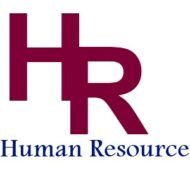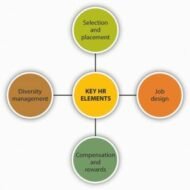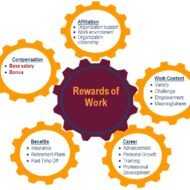Posted by Managementguru in Human Resource, Video Lecturers
on Aug 7th, 2014 | 0 comments

HR Startegy and Planning – HRM VIDEO 2 How are company strategy and HR strategy related?As part of an HR strategy which company functions should be of the highest priority?How to plan quantitative workforce demand on both strategic and operational level? A great inspiring lecture by Armin...

Posted by Managementguru in Business Management, Human Resource, Organisational behaviour, Principles of Management, Training & Development
on Mar 20th, 2014 | 0 comments

Managing Critical Factors of HR The prerequisite for an organization to excel in all aspects of its business activities is absolute strategic management of its HR functions.Human resource management is an extensive term that covers various aspects of personnel function. This discussion is focused on three main aspects that constitute human resource management. Personnel administration Human resource development Industrial relations Personnel administration: It can be also called as the HR module where policies and programmes are laid down by the HR department for the benefit of the human resource personnel. Employment and compensation are chiefly dealt with in personnel administration. While business firms in the corporate environment are in constant demand of man power, finding the right person for the right job is always a testing task for them. Right from job analysis to HR planning, recruitment, selection, placement, induction and orientation, HR department is held accountable to define and develop these operative functions. Mere acquisition and incorporation of human resource is not adequate, the organizations have to engage themselves in empowering their employees through competent training, motivation and refining their social relations. Job Assessment: Job assessment has to be done for fixing compensation that includes wages and salary administration, incentives, bonus, fringe benefits and social security measures. The shifting business environment and consumer requirements compel the organizations to restructure and re-engineer their organizational functions. These moves can be viewed as strategic responses reflecting from all domains of an organization, namely product, marketing, manufacturing etc., where people are the centre of focus. Human resource development: This is easier said than done. Firms are trying to evolve and employ various methodologies of training to enhance the performance levels to the desired standards. Performance cannot be achieved by coercion or bureaucracy, as the work force is protected by numerous enactment of labor laws enforced by various governments. Training and development is a separate entity by itself and is a continuous process that aims at the development of the organization as a whole and also facilitates employee career planning and development. Industrial relations: The following factors have to be scrutinized by the management to maintain good personal relations with the employees. Motivation Morale Job satisfaction Communication Grievance handling Discipline procedure Quality of work life Employee participation All said and done, the organizational health can be measured by checking the effectiveness of HR management through aspects like HR audit and research that aid the firms to analyze and understand the extent to which they are efficient in utilizing human resource for the benefit of their organization. The experience of a human resource manager comes in handy at situations like these, where he has to don different roles to suit the occasion. Personnel role-advisor for top management, policy maker, counselor to employees, spokesman of the company, change analyst, liaison Welfare role-researcher, catering man, motivator Clerical role-time keeping, wages and salary administration, record maintenance, human engineering Fire fighting legal role-negotiator, trouble shooter, peace maker, problem solver, grievance handling. The management employs scientific, analytical, psychological and social techniques to build the business around human resource, who are the real value additions to the...

Posted by Managementguru in Business Management, Human Resource, Organisational behaviour, Principles of Management
on Mar 13th, 2014 | 0 comments

Operative Functions of HRM Staffing Staffing is one of the managerial functions. But this function is normally performed by the HR managers for all the departments of the firm. In most organizations, the HR department establishes personnel policies and coordinates the HR functions of all the departments. This function is also called the operative function or HRM function. It includes, amongst others, the processes of hiring, training, compensating, appraising and retaining employees, and attending to their labour relations, health and safety, and equality concerns. Procurement Procurement refers to a string of activities undertaken by the HR managers for filling the present and future vacancies of the organization. The activities include job analysis and designing, HR planning, recruitment and, finally, the selection of suitable employees. Here, job analysis refers to both the determination of specific tasks and responsibilities connected to a job and identifying the skills, knowledge and abilities required for the job holder. HR planning involves choosing and placing the right person at the right job and at the right time. Recruitment involves gathering a pool of applicants from which suitable employees may be selected. Lastly, selection involves screening, testing, interviewing and hiring the most suitable employees for the organization. SCOPE AND CHARACTERISTICS OF HRM Development Development here refers to both employees’ training and management development. HR managers are accountable for conducting and supervising training and development programmes for employees. The very purpose of a training and development programme is to increase the employees’ competencies in their job by improving their knowledge, skills and abilities. Training and development is widely accepted as a method for enhancing the employee skills, increasing the individual and organizational performance, improving the employee morale, and achieving the business growth and success. Compensation Compensation refers to the determination of the pay scale and other benefits for the employees. Establishing and maintaining the pay system of an organization is one of the principal jobs of the HR managers. They must devise ways to ensure fair and equitable pay rates. In addition, HR managers should regularly manage the performance evaluation system of the organization, and continuously design reward systems such as performance-linked incentive plans and bonus and flexible work schedules. Maintenance The maintenance function aims at retaining efficient and experienced employees in the organization. This calls for creativeHR practices. In this regard, HR managers are responsible for offering a wide range of HR programmes covering occupational safety, health promotion and physical fitness, canteen facilities, recreation activities, transportation programmes, employee suggestion schemes, career counselling and growth for creating a positive work environment. OBJECTIVES AND FUNCTIONS OF HRM Integration It consists mainly of industrial relations and aims at ensuring good relations between the management and the employees. HR managers have to implement industrial relations programmes that would ensure ethical and fair treatment in disciplinary action, grievance redressal, and career management processes. They should also counsel the employees and the management to prevent and, when necessary, resolve disputes over labour agreements or other labour relation issues. It is to be understood here that the functions of HRM can vary widely from one organization to another, depending upon its nature, size, and objectives. For instance, a smaller organization may follow a shorter HRM process with a greater emphasis on functions like procurement and compensation and little or no priority for activities like training and development and industrial relations maintenance. On the contrary, large organizations may pursue a longer and more comprehensive HRM process to meet the requirements of both the management and the workforce. WANNA TAKE A HR QUIZ N CHECK YOUR HR IQ? 1. The development and application of employees’ skills and energies to accomplish the goals and objectives of the...






